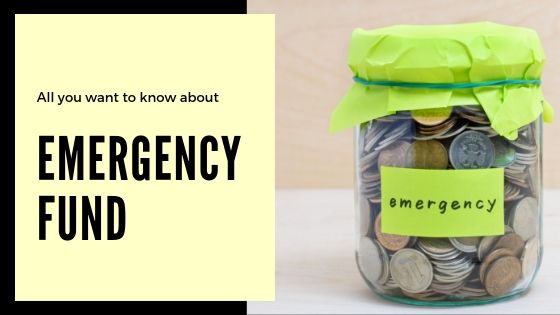- +91 9828449993
-





Emergencies come unannounced. No one can predict when it is going strike. The only thing that we can do is to prepare ourselves for any unforeseen circumstance. Having an emergency fund will help you to tide over emergencies like accidents, job loss etc. Hence, building an emergency fund should be the first thing on your mind before you start investing for your financial goals.
So, here’s everything you need to know about emergency funds.
An emergency fund is like a cushion that helps you to sleep soundly at night. It is money that you put aside against life’s unexpected events. It is not to be used for planned purchases such as buying a house or new car or your child’s higher education.
An emergency fund helps you to be prepared with anything that life throws at you. These emergencies can be accidents, immediate house repairs and job loss as well. Sorry, the late night pizza cravings is an emergency.
Ideally, an emergency fund should be in liquid investments such as liquid funds or savings account. Liquidity is the essential feature when it comes to emergency funds, as you would need the money at short notice. You should park two-thirds of your emergency corpus in liquid funds and the rest in a savings account. In case of short-term emergencies such as house repairs, you can withdraw money from your savings accounts. The liquid fund can help you save for significant emergencies like job loss.
You should have at least three to six months of expenses in the emergency fund. E.g., if you are earning Rs.50,000 per month and around Rs.30,000 goes in meeting your expenses, then you should have at least Rs.1 lakh in your emergency fund.
This amount is likely to cover most unpleasant surprises like a big car repair or house repair. Keeping aside three months worth of expenses is the bare minimum. The more you can save in your emergency fund, the better. However, you may want to consider what would happen in case of your job loss or non-payment of salary. It is because job loss is a big emergency. If you are in a field or position where finding a new job is tough, it is advisable that you save up to a year’s expense.
Let us take the recent Jet Airways fiasco to highlight the importance of saving money in case of a job loss. Jet Airways employees were not paid salary for a couple of months, and now many of them are staring at a bleak future. An emergency fund can help you to overcome such challenging scenarios.
The amount in your emergency fund also depends on your responsibilities. A person in their forties with kids and elderly parents will have higher responsibilities than someone in their 25s who recently joined the workforce and does not have any financial obligations.
There are two ways to calculate your expenses. The first way is to figure out the essentials that are utmost necessary such as bills, groceries, and in the second way, you also take the luxuries such as eating out and movies into account. It is always better to have a conversion with your spouse before considering the total amount that you need to save for your emergencies.
Once you know how much you need to save towards your emergency fund, the next step would be to build the emergency fund. Just like investing for any financial goal, building an emergency corpus also takes time. Keep aside a specific sum of money every month in a different bank account or a liquid fund. Building an emergency fund should be your priority. Hence, it is okay if you have to cut your investments. You can also do so by cutting back your expenses on luxury items or sell things that you do not use.
To summarise, emergency funds is the first step in financial planning. Use an emergency fund calculator or talk to your financial advisor to know how much you have to save in your emergency fund. Your financial advisor will be able to help in this entire process. So, start saving for your emergencies today.
+91 9828449993
+91 9214049993
1st Floor, Block No. 3, Ambay
Market, F-59, opposite Hotel
Solista, Chittorgarh,
Rajasthan 312001
Privacy Policy
Copyright © Invest Karo India. All rights reserved. |
Risk Factors – Investments in Mutual Funds are subject to Market Risks. Read all scheme related documents carefully before investing. Mutual Fund Schemes do not assure or guarantee any returns. Past performances of any Mutual Fund Scheme may or may not be sustained in future. There is no guarantee that the investment objective of any suggested scheme shall be achieved. All existing and prospective investors are advised to check and evaluate the Exit loads and other cost structure (TER) applicable at the time of making the investment before finalizing on any investment decision for Mutual Funds schemes. We deal in Regular Plans only for Mutual Fund Schemes and earn a Trailing Commission on client investments. Disclosure For Commission earnings is made to clients at the time of investments.
AMFI Registered Mutual Fund Distributor – ARN-129707 | Date of initial registration ARN – 01-Oct-2017 | Current validity of ARN – 30-Sep-2026
Grievance Officer- Kamlesh Somani | ksnext80@gmail.com
Important Links | Disclaimer | Disclosure | SID/SAI/KIM | Code of Conduct | SEBI Circulars | AMFI Risk Factors